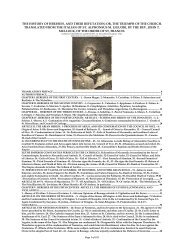The Writings of St. Francis of Assisi - + Saints' Works
The Writings of St. Francis of Assisi - + Saints' Works
The Writings of St. Francis of Assisi - + Saints' Works
Create successful ePaper yourself
Turn your PDF publications into a flip-book with our unique Google optimized e-Paper software.
THE WRITINGS OF ST. FRANCIS OF ASSISI<br />
the friars wear cheep clothing and let them be able to patch these with sacks and other pieces (<strong>of</strong><br />
cloth) with the blessing <strong>of</strong> God. · Which (friars) I warn and exhort, not to despise nor judge men,<br />
whom they see clothed with s<strong>of</strong>t and colored clothes, using dainty 275 food and drink, but rather let<br />
each one judge and despise his very self.<br />
Chapter III<br />
Concerning the divine <strong>of</strong>fice and fasting, and in what manner the friars ought to go through the<br />
world. 276<br />
Let the clerics perform 277 the Divine Office 278 according to the Ordo 279 <strong>of</strong> the Roman<br />
Church, except for the Psalter, 280 · for which they can have beviaries. 281 · Let the lay (brothers)<br />
indeed say twenty-four Pater Nosters 282 for Matins; 283 for Lauds five; for Prime, Terce, Sext and<br />
Nones, for each <strong>of</strong> these seven, however for Vespers twelve; for Compline seven; · and let them<br />
pray on behalf <strong>of</strong> the dead. 284 · And let them fast from the Feast <strong>of</strong> All Saints until the Nativity <strong>of</strong><br />
medievals on account <strong>of</strong> the absence <strong>of</strong> footwear in John 19:23, and is depicted frequently in<br />
Catholic art. Christ Himself had commanded His Apostles to wear only one tunic (cf. Mt 10:10<br />
and Lk 9:3).<br />
275 lit. delicatis, luxurious, refined; i.e. "gourmet."<br />
276 see fn. 145.<br />
277 lit. faciant, "perform," in the sense <strong>of</strong> "accomplish"; the requirement <strong>of</strong> daily recitation <strong>of</strong> the<br />
Office was reaffirmed at the Fourth Lateran Council (1215 A.D.), constitution XVII.<br />
278 <strong>The</strong> Divine Office is the traditional, daily, recitation <strong>of</strong> the psalms. It originated as a devotion<br />
among the Jewish people. Christ and the Apostles themselves are said to have practiced it. It<br />
became the characteristic daily duty <strong>of</strong> monastic life in Egypt during the third century A.D.. By<br />
<strong>St</strong>. <strong>Francis</strong>' day it had long been embellished with antiphons, readings, hymns and prayers fitted<br />
to the liturgical calendar, and had been the customary daily prayer <strong>of</strong> the clergy <strong>of</strong> the Roman<br />
Church for centuries.<br />
279 i.e. according to the liturgical books <strong>of</strong> the Roman Rite. <strong>St</strong>. <strong>Francis</strong> specifies this because by<br />
his own day, the Gallican Rite, which grew out <strong>of</strong> the liturgical reforms <strong>of</strong> the Carolingian period<br />
was celebrated nearly everywhere, while the celebration <strong>of</strong> the Roman Rite had been reduced to<br />
the Pope's private chapel. Out <strong>of</strong> devotion to <strong>St</strong>. Peter, who originated the liturgical traditions <strong>of</strong><br />
the Roman Church, <strong>St</strong>. <strong>Francis</strong> chose the Roman Rite for his Order.<br />
280 A Psalter was a book containing the psalms recited during the Divine Office. In <strong>St</strong>. <strong>Francis</strong>'<br />
day the use <strong>of</strong> the Gallican Psalter prevailed over that <strong>of</strong> the Roman Psalter; the difference being<br />
principally in the translation <strong>of</strong> the Psalms.<br />
281 lit. ex quo, "for which purpose." A "breviary" is a portable book for the recitation <strong>of</strong> the<br />
liturgy <strong>of</strong> the hours. In <strong>St</strong>. <strong>Francis</strong>' day they had just become popular, and were a necessity for<br />
clergymen who traveled <strong>of</strong>ten.<br />
282 i.e. "Our Fathers;" the Our Father was to be said in Latin, as is the ancient custom <strong>of</strong> the<br />
Roman Church.<br />
283 Matins is the liturgical ceremony at the beginning <strong>of</strong> the morning, i.e. before sunrise; Lauds, at<br />
sunrise. <strong>The</strong> next ceremonies are named according the Roman custom <strong>of</strong> numbering the hours <strong>of</strong><br />
the day from the time <strong>of</strong> sunrise: Terce (3 hours), Sext (six hours), Nones (9 hours). Vespers<br />
was prayed at sunset; Compline before retiring for the night.<br />
284 Normally this meant the Requiem aeterum, cf. RegNB III, 10.<br />
Page - 76













